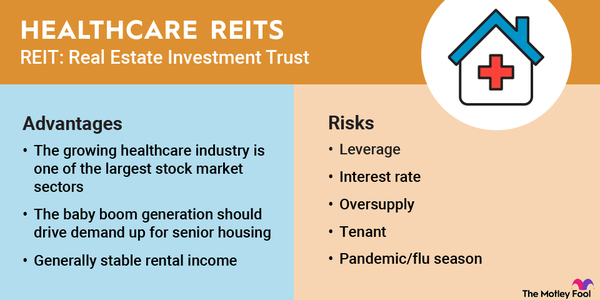Real estate investment trusts, or REITs, are known for their dividends. The average dividend yield for equity REITs was around 4% in mid-2024 -- more than double the dividend yield of the average dividend stock (The S&P 500's dividend yield was less than 1.5%). Meanwhile, some high-dividend REITs offer yields significantly more than the industry average. That potentially makes them excellent options for those seeking passive income from real estate.
However, it's important to look at more than a REIT's yield when investing for dividend income. You'll want to look at metrics that will give you more insight into the health of a REIT and how likely it is to provide you with sustainable dividend payments each year.

What to look for
What to look for in a REIT before investing
However, it's important to look at more than a REIT's yield when investing for dividend income. You'll want to look at metrics that will give you more insight into the health of a REIT and how likely it is to provide you with sustainable dividend payments each year.
You want to make sure the dividend yield isn't too good to be true when investing in a high-dividend REIT. There are a few red flags to look for that may point to some trouble on the horizon.
- A high leverage ratio: A REIT may be paying high dividends because they're using too much leverage to acquire their properties. They are quite vulnerable to any dips in the real estate market or spikes in vacancy if their real estate investment portfolio is overleveraged. Ideally, look for a REIT with a leverage ratio below 6.0 times.
- High dividend payout ratio: REITs pay high dividends because the IRS requires that they pay 90% of their taxable income to shareholders. However, that taxable income doesn't include tax deductions like depreciation. That gives them some room to keep cash on hand. Most REITs use metrics like funds from operations (FFO) to better reflect the actual cash flow they produce that they could use to pay dividends. Ideally, a REIT should have a payout ratio of less than 80% of its cash flow.
- Declining cash flow: A major red flag for any type of investment is falling earnings. A bad quarter can be easily overlooked. A steady decline in income is usually something to stay away from. A REIT may be invested in properties leased to struggling tenants or property types that are losing demand, which would hurt their rental income. They may also be selling properties to pay off debt, which would also result in less rental income.
List of high-dividend REITs
Three best high-dividend REITs to buy right now
Many REITs pay high-yielding dividends. However, not all of them can sustain and grow their payouts. Three high-dividend REITs that have stood out for their ability to maintain and grow their above-average dividends are Realty Income (O 0.23%), NNN REIT (NNN 0.32%), and VICI Properties (VICI 0.41%). Here's a look at each.
| REIT | DIVIDEND RATE (ANNUAL) | DIVIDEND YIELD |
|---|---|---|
| Realty Income | $3.156 | 5.3% |
| NNN REIT | $2.32 | 5.1% |
| VICI Properties | $1.66 | 5.2% |
1. Realty Income
1. Realty Income
Realty Income lives up to its name. The diversified REIT declared its 650th consecutive monthly dividend in mid-2024. The company had increased its payout for 107 consecutive quarters and every year since it came public in 1994. It has grown its payout at a 4.3% annual rate since its public market listing.
The REIT generates very stable rental income. It owns a diversified portfolio of properties across the retail, industrial, gaming, and data center sectors. Roughly 90% of its rent comes from tenants in industries resilient to economic downturns or isolated from the pressures of e-commerce. The REIT net leases these properties to high-quality tenants under long-term contracts, often with annual rental escalation clauses. Those leases supply the REIT with steadily rising rental income.
Meanwhile, Realty Income has a conservative dividend payout ratio (less than 75% in mid-2024) and one of the strongest balance sheets in the REIT sector (5.3 times leverage ratio). Those features give it the financial flexibility to acquire additional income-producing properties.
Realty Income estimates that a combination of rising rental income and continued portfolio expansion will grow its FFO per share by 4% to 5% per year. That should enable the REIT to continue increasing its high-yielding dividend.
2. NNN REIT
2. NNN REIT
NNN REIT is a retail REIT that owns freestanding properties triple net leased (NNN) to growing national and regional retailers. It focuses on durable properties like automotive services, convenience stores, restaurants, and family entertainment centers. Those leases provide it with steadily rising rental income.
The REIT has an exceptional record of increasing its dividend. It delivered its 35th consecutive year of dividend growth in 2024. That put it in an elite group. Only two other REITs and less than 80 publicly traded companies in the U.S. have delivered 35 or more years of increasing their dividends.
NNN REIT is in an excellent position to continue increasing its high-yielding dividend. It has a low dividend payout ratio (less than 70% of its FFO in mid-2024) and a conservative balance sheet with a below-average leverage level. That gives it the financial flexibility to continue buying income-producing retail properties. Its steadily growing portfolio and cash flow should enable it to continue increasing its high-yielding dividend.
3. VICI Properties
3. VICI Properties
VICI Properties is a young REIT formed in 2017 as a spinoff from Caesar's Entertainment (CZR -0.52%) as part of a reorganization under its Chapter 11 bankruptcy. It has grown tremendously since then, acquiring additional casino properties in sale-leaseback transactions, merging with another large gaming REIT, and diversifying into additional experiential real estate types. It now owns several iconic casino properties along with a growing portfolio of experiential properties like bowling entertainment centers.
The REIT leases its properties back to the operators under triple net structures, half of which tie rents to inflation. That supplies it with a very stable and growing rental income.
Meanwhile, it has a reasonable dividend payout ratio (around 75%) and a strong investment-grade balance sheet with a sub-5.5 times leverage ratio. Those features give it the financial flexibility to continue expanding its investment portfolio. In addition to making acquisitions, VICI Properties provides funding to partners to finance property upgrades and development projects, which also supplies it with predictable income.
VICI Properties has an excellent record of increasing its dividend. It has increased its dividend every year since coming public. Meanwhile, it has grown its payout at a peer-leading rate during that time frame (7.9% compared to the average of 2.2%). With a strong financial profile and long growth runway, this REIT should have no trouble continuing to increase its high-yielding dividend.
More real estate topics
Investing for dividend income
High-dividend REITs can provide consistent income to investors. However, it's important to do your research when choosing REITs to avoid falling into a yield trap. Realty Income, NNN REIT, and VICI Properties all have well-covered payout ratios, sound financial profiles, and growing rental income, so these three high-dividend REITs should provide investors with steadily rising dividend income in the coming years.

































